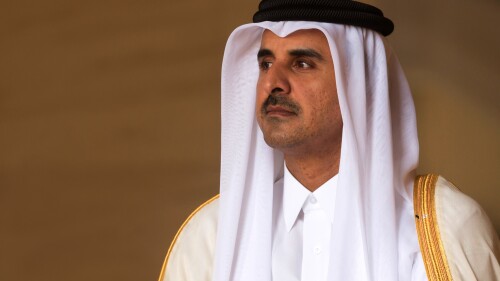Two years ago, a Middle East Forum colleague and I met with a former Israeli intelligence official who works on blocking Palestinian terror finance flowing into the then-Hamas controlled Gaza Strip and into Judea and Samaria.
What gnawed away at us was the vast sums of money being pumped into Gaza, ostensibly for humanitarian aid but in practice filling the coffers of the U.S.-designated terrorist organization Hamas.
Qatar’s pro-Hamas regime was the main source of the funds.
We wondered: What mechanisms could be implemented to stop the money from being poured into Hamas’s arsenal? The terror finance expert mentioned an ATM card for each Gazan family to receive funds directly, but brushed it off as a band-aid approach.
Bennett, like his predecessor Benjamin Netanyahu, still permitted fossil fuel-rich Qatar to deliver funds through other means.
In 2021, then-Israeli Prime Minister Naftali Bennett stopped permitting the suitcases of cash Israel had allowed Qatari officials, including its envoy to Gaza Mohammed al-Emadi, to deliver to Gaza.
Bennett said at the time: “I stopped the cash suitcases because I believe that horrendous mistake— to allow Hamas to have all these suitcases full of cash—goes directly to reordering themselves against Israelis. Why would we feed them cash to kill us?”
Yet Bennett, like his predecessor Benjamin Netanyahu, still permitted fossil fuel-rich Qatar to deliver funds through other means. In 2019, Netanyahu told Time magazine, “Gaza is basically controlled by Hamas, which is a militant Islamic organization that really doesn’t allow any kind of real development to take place because they take all the money that comes in from international support—and there’s quite a bit of it—and they put it into turning tunnels into a terror machine.”
Avigdor Liberman resigned as Israel’s defense minister in November 2018 in protest of the rule enabling Hamas’s financing, warning at the time, “We are buying quiet for the short term at the price of serious damage to national security in the long term.” He criticized allowing funds to be sent to Hamas-controlled Gaza as “surrendering to terror”—a view that proved prescient.
Open-source information indicates that Qatar—a regime that counter-terrorism experts in congressional hearings have urged be designated a state-sponsor of terrorism—has funneled several billion dollars into the Gaza Strip over a 10-year period and continues to send money to Gaza via the U.N.
The actual figure is almost certainly higher because of the largely laissez-faire approach to Qatari money transfers to Gaza. An independent commission should investigate the events of October 7 determine how much money Qatar gave Gaza—i.e., Hamas—although it is anyone’s guess whether that will happen.
The October 7 massacre nearly coincided with the 50th anniversary of the devastating Syrian and Egyptian invasion of Israel that began October 6, 1973, the holiest day of the year for Jews—Yom Kippur. Israel would do well to resurrect the robustness of the post-Yom Kippur War Agranat Commission of Inquiry, which used the term “conceptzia” (a governing strategic assumption) to discuss Israel’s conceptual failures that led to that surprise attack. October 7 saw a tragic replay of that faulty conceptzia.
Israel would do well to resurrect the robustness of the post-Yom Kippur War Agranat Commission of Inquiry.
The conceptzia in 1973 was blind faith in the belief of Israeli military officials that Egypt would not invade until it had taken delivery of sophisticated Soviet fighter jets—a naivete tragically exposed when then-Egyptian President Anwar Sadat attacked before the new planes’ arrival.
Act 2 of the conceptzia came with Netanyahu’s dedication to permitting largely unregulated amounts of cash from a state-sponsor of Islamic terrorist movements and states—Qatar—to be poured into Hamas under the mistaken belief that the money would produce “quiet” in the south and somehow housebreak a jihadi terrorist entity.
To be fair, several U.S. administrations and the Europeans subscribed to the bogus idea that for Hamas’s leaders, including its Gaza-based ruler Yahya Sinwar, economic growth and material support could trump their genocidal Islamist ideology.
The Qatari funds enabled Hamas to create an underground tunnel metropolis nicknamed the “Gaza metro.” Estimated at 500 km. in length, it surpasses the London Underground and permitted Hamas to store and smuggle weapons via the Philadelphi Corridor that borders Egypt.
In December, the IDF gave me a tour of what it termed as the “Sinwar Project” terrorist tunnel in Gaza. The IDF spokesman, Rear Admiral Daniel Hagari, said during the tour, “We estimate it is 50 meters deep and 4 km. long and have found RPGs and AK-47s stored in depots. Many smaller tunnels lead off it.”
There have been some resignations among military staff since October 7 and recognition of the grave second conceptzia error. For example, former Mossad director and Israeli national security advisor Yossi Cohen was asked in April on Israel’s Keshet 12 TV regarding Israel’s aid to Gaza’s economy, in that “Hamas used this for tunnels, for weapons, for its people, for training, and actually for October 7.” Cohen replied, “This is very true. And this is why I said this almost three years ago, even publicly: This was a mistake.”
A key to preventing a repeat of the October 7 attacks is to end Qatar’s influence in Gaza by locking it out of the Strip.
Yet Cohen omits Qatar’s role in breathing life and fire into Hamas’s military superstructure. Following suit, Netanyahu avoids pinning the blame on Qatari money for the expansion of Hamas’s military apparatus because doing so would draw attention to his failures.
Qatar’s chief aim is to preserve Hamas. A key to preventing a repeat of the October 7 attacks, therefore, is to end Qatar’s influence in Gaza by locking it out of the Strip.
One window into the court of the pro-Hamas regime in Doha can help to illustrate the danger to Israel posed by Qatar’s ruling family, the House of Al-Thani.
Before being appointed Qatari Foreign Ministry spokesman and advisor to the prime minister, Majed Al-Ansari wrote a 2021 column in the state-owned newspaper Al Sharq supporting Hamas rocket fire on Israeli communities. Al-Ansari wrote: “The victory celebration in this latest battle is a celebration of continued progress toward victory in the struggle, since there is a great difference between resistance with stones and bare chests and resistance in which 3,000 missiles are launched into the entity’s cities in 10 days.”
In March, Bill Russo, then assistant secretary of state in the Bureau of Global Public Affairs, welcomed Al-Ansari for the sixth annual U.S.-Qatar Strategic Dialogue in Washington. Given America’s role as the principal foreign guarantor of Israel’s security, Qatar’s infiltration of American foreign policy circles further illustrates Doha’s baleful role in undermining Israel’s safety at home and abroad.








